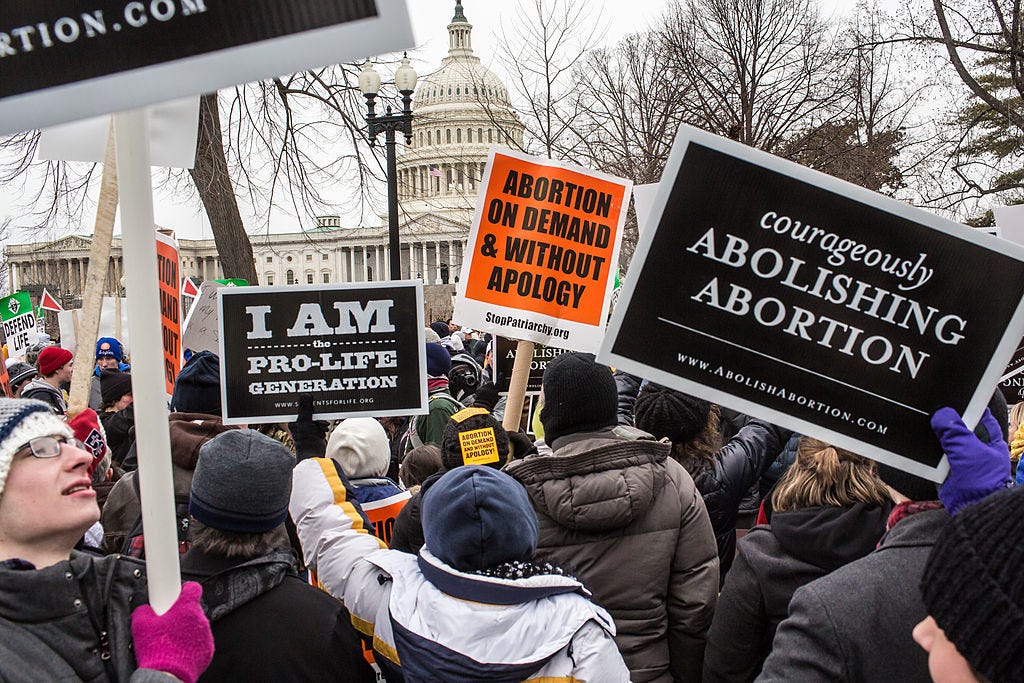Abortion Battle Leaves Legislators With Nowhere to Hide
As abortion morphs from a legal issue to a political one, legislators are going to have to step up

When the U.S. Supreme Court overturned Roe v. Wade in 2022, pro-life activists sighed in relief. With the high court’s decision in Dobbs v. Jackson Women’s Health Organization, the pro-lifers had at last won the 49-year legal battle over abortion and could finally retire from the field. Congratulations were passed around, backs were slapped and banquets were held.
Their celebrations were justified. The long-derided 1973 decision was terrible law and jurisprudentially unsound, according to justices as diverse as Antonin Scalia and Ruth Bader Ginsburg. The only surprise was that it took so long to scuttle.
As the confetti was swept from the ballroom floor, conservative politicians and advocates sat back in their recliners and considered their work done. But they didn’t understand that reversing Roe was merely the end of the beginning. Instead, it was pro-choice activists who saw the reality and were deep into their plans for the next, and much larger, part of the war.
Legislators had enjoyed the decades-long holiday from the divisive issue of abortion. Sure, they could give a speech or add a pro-life paragraph to a fundraising pitch, but the heavy lifting was left to the courts. With the end of Roe, however, it was time to match their rhetoric with action—to wake up to the new reality, craft new laws and build consensus. Instead, they hit the snooze button.
Arizona’s Ugly Political Battle Over Abortion
It’s hard to overstate how foolish and shortsighted the Republican reaction has been, both on Capitol Hill and in statehouses from coast to coast. For most of their lives, abortion was primarily a judicial issue. The Supreme Court ended that era by tossing the social hot potato to state legislatures. The legal battle was over, but the political battle had just begun. After avoiding tough decisions for nearly five decades, elected officials couldn’t hide anymore.
It’s not as if the high court didn’t warn them. “Our decision returns the issue of abortion to those legislative bodies,” Justice Samuel Alito wrote, “and it allows women on both sides of the abortion issue to seek to affect the legislative process by influencing public opinion, lobbying legislators, voting, and running for office.”
That decision was rendered two years ago, but its impact continues in a host of different states, from California to Ohio to Florida. My home state of Arizona is a good example of the dynamics at play. Earlier this month, the high court of Arizona handed down a decision that echoes Dobbs. The Grand Canyon State had to decide whether a 2022 state law prohibiting abortion after 15 weeks superseded an 1864 territorial law forbidding abortion at any stage unless necessary to preserve the life of the mother. When Arizona achieved statehood 50 years later, the 1864 law was grandfathered in.
After reviewing the arguments and case histories, a 4-2 majority found that because the Civil War-era law remained on the books, it remained enforceable. The decision didn’t reflect the justices’ views on abortion one way or the other. Rather, they viewed that such a policy should be decided by citizens and not courts. And indeed, the old law had never been repealed—something the state House and state Senate could have done anytime they wanted.
“A policy matter of this gravity must ultimately be resolved by our citizens through the legislature or the initiative process,” Justice John Lopez said, writing for the majority. “Today, we decline to make this weighty policy decision because such judgments are reserved for our citizens. Instead, we merely follow our limited constitutional role and duty to interpret the law as written.”
Just as SCOTUS did two years ago, the Arizona Supreme Court tossed the hot potato to the state legislature where it belonged. But nothing angers a politician more than asking him to do his job.
Arizona Democrats were upset, yet their response was quiet compared to the panic among longtime pro-life Republicans. Senatorial candidate Kari Lake, most famous for her 2022 gubernatorial loss, once called the 1864 ban “a great law that's already on the books.” That hardline position in the last campaign softened a few weeks ago. “This is a very personal issue that should be determined by each individual state and her people," she posted to X. “I oppose today's ruling.”
Lake called on her former opponent, Gov. Katie Hobbs, to “come up with an immediate common-sense solution.” She can read polls and now understands a complete ban jeopardizes her already uphill run for the Senate. Donald Trump must agree: He applauded Lake’s flip-flop. “The Governor and the Arizona Legislature must use HEART, COMMON SENSE, and ACT IMMEDIATELY, to remedy what has happened,” Trump posted on Truth Social.

Meanwhile, recent assemblies in Arizona’s statehouse over the abortion issue have looked less C-SPAN than WWE. One Republican tries to initiate a vote to reject the total ban, and another Republican kills it by calling for a recess. Democrats scream from the sidelines, uploading every rant to help their fundraising efforts.
It doesn’t take a cynic to find Democrats’ outrage self-serving. The justices’ decision has poured cash into Democrats’ coffers and increased their standing in the polls. They’re busily gathering signatures to place an abortion rights initiative on the November ballot, which can only help boost turnout. The territorial law won’t take effect until June 8, so there’s plenty of time to kill it. Until then, progressives will be sure to get a lot of use out of their “Handmaid’s Tale” costumes.
While local media kvetches about incivility consuming the Arizona State Capitol, this is exactly the outcome Republicans should have expected back when Roe was struck down. Neither the U.S. nor Arizona Supreme Courts ended abortion; they told the legislative branch to do their job.
Conservative legal experts had a great plan to win at the bench and executed it to perfection. We’re now two years into the post-Roe era, and GOP politicos are still flailing. Simply wishing away the abortion debate isn’t a strategy.
The Congressional Comfy Chair
Decade by decade, courts and the administrative state have removed tough decisions from the legislature. The Framers assumed lawmakers would jealously protect the powers granted them in the U.S. and state constitutions. Instead, federal and state representatives and senators have enjoyed the free ride. It turns out their main concern isn’t responsibility; it’s reelection. They no longer have to make the tough calls and can focus on talking tough.
Why vote on a military reprisal in the Middle East, when you can point to the Authorization for Use of Military Force passed in 2001? If the strikes fail, the president will take the heat—not some member of Congress.
Why debate a green energy bill when you can let the Environmental Protection Agency achieve the same result through regulation? Come election time, weak-kneed politicos will take a poll and publicly praise or denounce the action after the fact. Those damned bureaucrats! Keeping that comfy chair in Congress is the goal, and making tough choices gets in the way of a good sit.
When the courts had the final say on abortion, politicians could mirror whatever position worked for their constituents back home. Some claimed to be against it in all cases, while others preferred some arbitrary deadline. It was all hot air.
In a post-Roe world, legislators need to put themselves on record. But of course, this makes things awkward. Do they outrage social conservatives with a 15-week ban? Do they appease those voters with a total ban and risk losing a general election? No wonder Arizona Republicans are a bit twitchy these days.
According to a 2022 Associated Press poll, just 6% of Arizona voters said abortion should be illegal in all cases, while 61% prefer that abortion be legal in most or all cases. The electoral math points to a repeal of the 1864 law before it takes effect. But until that happens, Republicans will bicker and Democrats will howl.
The whole business will be loud, angry and chaotic. But that’s how democracy is supposed to work. The real shock is that Republicans were surprised by any of this.
SCOTUS had telegraphed the end of Roe for years. Republicans should have had new legislation waiting for that moment, along with a comms strategy to sell it. They should have prepared for contentious debates, close votes and massive public reaction. That’s their job, after all.
With a big election looming, politicos need to state their specific position and take action to achieve it. If they refuse, voters will hire new leaders.





